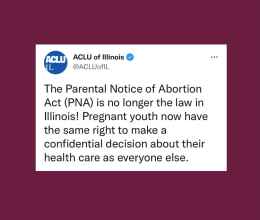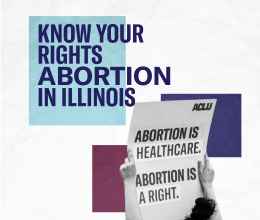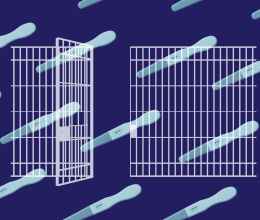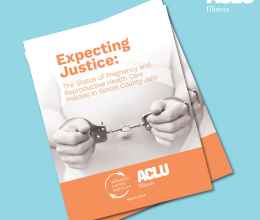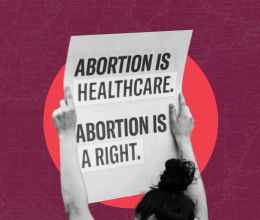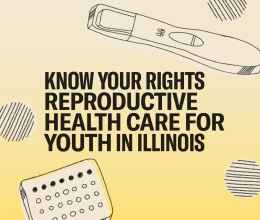
By Patrice Bugelas-Brandt, Communications Department Volunteer
The day started with a cold downpour of rain, drenching everyone and everything, as we boarded a bus at 6:00 a.m. in Chicago to travel to Springfield, Illinois. There was no promise of sunshine for this trip, literally or figuratively, as we headed to the state capital to voice our opposition to the recently-enforced Illinois Parental Notification Act (PNA). Currently, there is not a legislative proposal before the Illinois General Assembly to rescind the law. So everyone making the trek to Springfield understood that the planned march and rally was largely symbolic. Yet, by late afternoon, as we all walked down the capitol steps, under a still misty-grey sky, everyone was smiling and there was a swagger of accomplishment as we re-boarded the buses home.
Ever since a State Supreme Court ruling paved the way for enforcement of the Act last August, medical providers in Illinois have been required to give a 48 hour notification to a parent, grandparent, step-parent (if they live with the teen) or legal guardian before performing an abortion for a patient under the age of 18. The required notice is necessary even if that teen already has a child.
Recognizing that the law puts many young people, living in less than ideal families, at risk, the ACLU of Illinois put in place the Judicial Bypass Coordination Project which enables teens to anonymously seek an exemption to the law from an Illinois judge. Teens can call the project’s hotline for information and free legal representation. The reality remains, however, that even under the best of circumstances, the law slams teens facing an unwanted pregnancy with complicated obstacles and time delays that compound an emotionally devastating problem. As Allison Carter, Director of Advocacy and Outreach at ACLU of Illinois, explained to the anti-PNA marchers, the law essentially tells young pregnant teens: “You got it bad? Let’s make it worse.”
Coordinated by the ACLU of Illinois with the Illinois Caucus for Adolescent Health (ICAH) and the Chicago Abortion Fund the day’s agenda included: a training session on how to approach, and talk to, state representatives about PNA and why it should be rescinded; a five block march to the capital building; a two hour window for directly meeting with our respective Illinois House members; and a closing rally in the capitol rotunda. The PNA protest effort had drawn abortion rights advocates from across the state and marchers represented all age groups (three months to 60 plus years), all ethnic groups and both men and women.
Most inspiring of all, the effort was highlighted by a group of teens who told their stories during the pre-march training session and the closing rally. Christian, Jasmine, Erica, Torrance, Michelle, Ranita. Anthony and Akosuah all members of ICAH’s Youth Council, put human faces on the unintended harm caused by the Parental Notification Act. They told of friends and sisters traumatized to find themselves pregnant and terrified that their parents would find out. Emotional degradation, physical harm and homelessness were the promised consequences if their pregnancy was discovered.
During the training session, Anthony told the group how terrified his teenage sister was to learn she was pregnant. They had been raised by loving but “rigid, old fashioned parents” who had pounded into their children that each was “a reflection of the family, the household” and to never “disappoint.” He explained his sister knew she could not continue to live at home if her pregnancy was discovered. Others told of young women so desperate to cut short their pregnancy, without their parents’ knowledge, that they would pay friends to punch them in the stomach with the hope they would miscarry.
Armed with the confidence built during the training session we marched into the capital chanting “Stop PNA!” Standing outside the doors of the Illinois House, which was in session, each marcher individually sent in notes, asking their district representatives to come out for a brief talk. And many did.
Constituents talked and their legislators listened. Whether or not these first “talks” cemented concurrence on the need to reverse PNA, the process was empowering. Any cynicism felt about marching that day dissolved watching the faces of the high-school-student marchers as they spoke to House members. They had marched to voice their opposition to the Parental Notification Act; this was their moment to be heard.
The closing rally in the capitol rotunda recapped the messages of the day emphasizing the need for young teens to have access to safe, legal abortions without mandatory parental notification. Representative Kathleen Willis (D-Addison) briefly joined the rally and expressed that, as a parent with four now adult-children, she very much hoped her children would have confided in her should they have found themselves confronted by an unwanted pregnancy. Yet she recognized that not every teen has a supportive family and understood that the Parental Notification Act jeopardized the safety and well-being of many teens living with abusive parents or relatives. The audience gave her a big round of applause.
Members of ICAH’s Youth Council were the final speakers. “This is democracy. Right here, today, what you did in our state capital----this is how democracy works,” Christian reminded everyone gathered under the capitol dome. The day’s work mattered. Christian’s call, joined by the 50 still remaining marchers, echoed off the rotunda’s pink and rust colored marble pillars. The rally closed with one last chant: “Stop PNA.” The marchers then spilled out of the capital to take selfies standing at the base of Abraham Lincoln’s statue.
